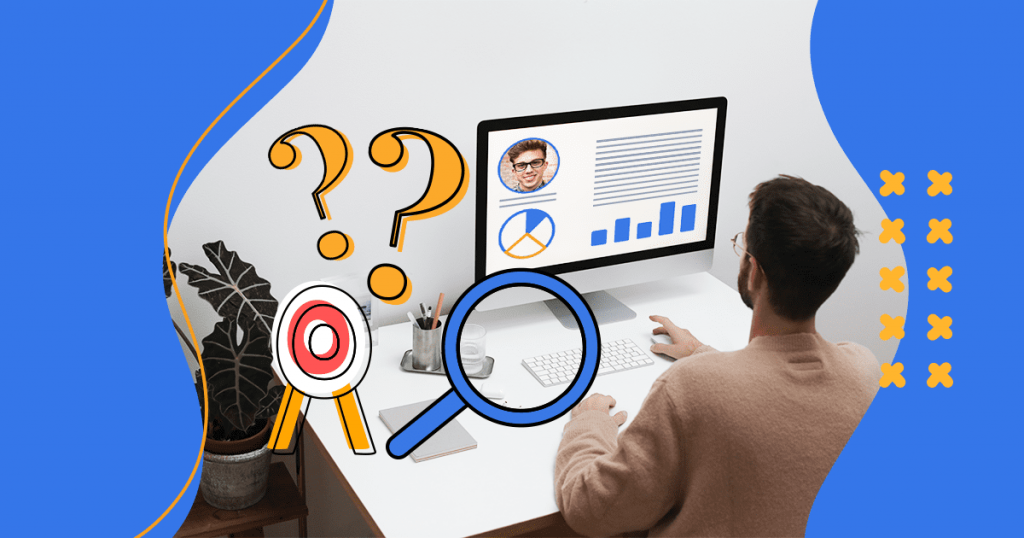Successful digital marketing and amazing content creation go hand in hand with good reason.
Offering your audience value in the form of informative, engaging content is the key to building brand recognition and eventually converting casual readers into paying customers.
But before you can successfully reach an audience, you need to get a good read on who they really are.
That’s where a set of well-crafted buyer personas come in — hypothetical profiles based on detailed data and careful research that can be used to tap into the mindset of particular types of customers.
But how do you come up with effective buyer personas? By asking questions about your ideal customers and what motivates them, of course.
Below are some example questions to start with.
However, be sure to finetune your buyer persona questions to fit your industry. You can begin by self-considering your questions, but you should also contact your existing and potential customers to ask them directly, as well.
The more information you gather, the easier it will be to keep refining your buyer profiles into the future.
- 1. Who are they?
- 2. What is their professional life like?
- 3. What are your customer’s core values?
- 4. What are your customer’s pain points?
- 5. What are their consumption habits like?
- 6. What traits might a negative buyer persona have?
- BONUS: Using Buyer Personas Effectively
- Wrap Up: Create Perfect Buyer Personas and Get Ahead
1. Who are they?
Your first round of buyer persona questions should tackle the basics of who your customers are as people.
Consider what broad demographics they belong to and how that might affect their core values and consumer behavior.
Here are a few examples to add to your running list, but don’t be afraid to come up with others of your own as they apply to your industry.
- How old is your customer?
- Are they married or single?
- Do they have any children? How many and what ages are they?
- Does your customer identify with a particular gender? Which one, if any?
- Where does your customer live?
- What level of education have they reached?
- How much do they earn?
Of course, questions like the above may or may not be appropriate to ask your customers directly.
However, information like this is easy enough to glean from existing company records, public data, and other readily available sources.
2. What is their professional life like?
Analyzing information about a customer’s professional life is about more than assessing how much disposable income they might have to spend on consumer goods and services.
A person’s professional choices dictate a lot about their decision-making process, their general worldview, and how they spend their free time.
- What industry does your customer work in?
- Do they work for a particular company? How big is it?
- What is their current job title? What job title would they like to have?
- What do your customer’s long-term professional goals entail?
- Who is their boss? What type of relationship do they have with this person?
- What does a typical day on the job look like for your customer?
- Do they manage others or have any special skills that apply to their job?
Keep in mind that a person’s professional life can (and often does) extend to the role they play within their household or community.
People who are full-time students, stay-at-home parents, and so forth may not have traditional jobs, but they still spend money and make buying decisions, sometimes on behalf of their entire household. Adjust your buyer persona questions accordingly.
3. What are your customer’s core values?
Everyone has a deeply held set of core values, and your customers are certainly no different.
Those values play an essential role in your customers’ lives.
Knowing what they are can help you figure out what’s most important to those who buy your products and how best to market your products to them.
Get to the bottom of them by asking buyer persona questions like the following.
- What are your customer’s life goals, both professionally and personally?
- Where does each goal fall on their list of priorities, and how do they determine that?
- How does your customer go about making everyday decisions?
- How does their decision-making process relate to their spending habits?
- What role does money play in your customer’s value system?
Getting a good read on what’s most important to your customer, both inside and outside of a professional context, doesn’t just help you close sales with those people.
It can also help you figure out how best to frame your products as resources that can help them build the life they want most.
4. What are your customer’s pain points?
Creating effective buyer personas is about more than simply pinpointing what matters to your customers and keeps them motivated in life.
It’s just as important to understand what holds them back, as those things also influence purchasing decisions and affect how they respond to marketing attempts.
That said, here are some excellent buyer persona questions for getting to the bottom of the challenges, fears, and pain points your customers might be facing.
- What challenges is your customer currently facing in the pursuit of their goals?
- What problems and obstacles stand in between your customer and the life they want?
- How might your products and services help address those issues?
- Have they already considered seeking out a solution to those problems?
- What would motivate them to choose or eliminate a potential solution?
- What are the consequences of choosing the wrong solution or failing to act at all?
Although not every decision a person makes in life is based on fear, desperation, frustration, or pain, those factors do play a role in whether a person actively seeks out a solution.
It also dramatically affects how they might choose one solution over something comparable from a competitor.
5. What are their consumption habits like?
Once you know your potential customers and what motivates them, it’s time to figure out how best to reach them with your content marketing strategies.
But first, you need to compile more information on their habits as consumers. Yes, part of doing this properly means considering their usual routine when considering and finalizing purchases.
However, it also means analyzing how, where, when, and from whom they might be getting their information about what to buy.
- How and where does your customer spend their free time?
- What hobbies and pastimes do they enjoy?
- What do their social circles look like? What are their friends into?
- Does the person use social media? How often? Which platforms do they prefer?
- Does the person belong to any organizations, clubs, or groups?
- What types of media does the person consume?
- Do they go to live events, conventions, or conferences?
- How do they typically communicate with other people?
- Where do they get their information?
- How do they go about researching potential buying decisions?
Learning where a customer gets their information from, how they prefer to communicate, and what they like to do with their spare time gives marketers an excellent idea of how to approach a content production campaign.
Naturally, you don’t just want to create the type of content your desired customers like most.
You also want to position it where they actually spend time, especially when they’re looking for recommendations on whether to pull the trigger on a particular purchase.
6. What traits might a negative buyer persona have?
Successful marketing is only part of figuring out who’s a great candidate for your content, products, services, and brand.
It’s just as important to know who’s a bad fit or perhaps just not a good target audience for your marketing.
This helps you avoid wasting precious marketing dollars and valuable effort trying to please people who aren’t right for what you offer.
Here are some buyer persona questions that can help with that.
- Have you ever had a customer relationship not work out? What were the reasons?
- Which types of people simply don’t “get” your brand message or need your products?
- Which demographics don’t have the budget for the product you’re looking to market?
- Are there people for whom your product has no possible use or application?
- Which demographics represent a poor return on your original marketing investment?
- What traits (if any) have your past problem customers all had in common?
Keep careful records on an ongoing basis regarding your customers, so you know where and how to focus your efforts for maximum effect in the future.
BONUS: Using Buyer Personas Effectively
Once you’ve collected and organized all your data on your existing or desired customer base, it’s time to build your buyer personas and put them into action.
Create as many (or few) as make sense. Personas can represent subsections of your existing customer base or various types of consumers you’re hoping to target with your next marketing campaign.
Then start brainstorming your next round of marketing content with these profiles in mind.
- What type of content does each customer type favor?
- Where do they go to consume it?
- What might inspire each customer type to share your content with others?
- How is each type of customer most likely to find your company or products?
- What newsworthy topics related to your products might interest each customer type?
- How will you, as a marketer, identify each customer type out in the field?
Wrap Up: Create Perfect Buyer Personas and Get Ahead
When used wisely and creatively, buyer personas can be a very accurate way to put yourself in your customer’s shoes, figure out what they want to see, and use what you know to sell your products.
Starting the process by asking the right buyer persona questions gets you moving in the right direction. Using the right tools helps you complete the process to perfection.
Take the guesswork out of crafting beautifully accurate customer profiles with our handy buyer persona generator.
Learn who your ideal customer really is, develop effective ways to get through to them, and close more deals starting right now!









